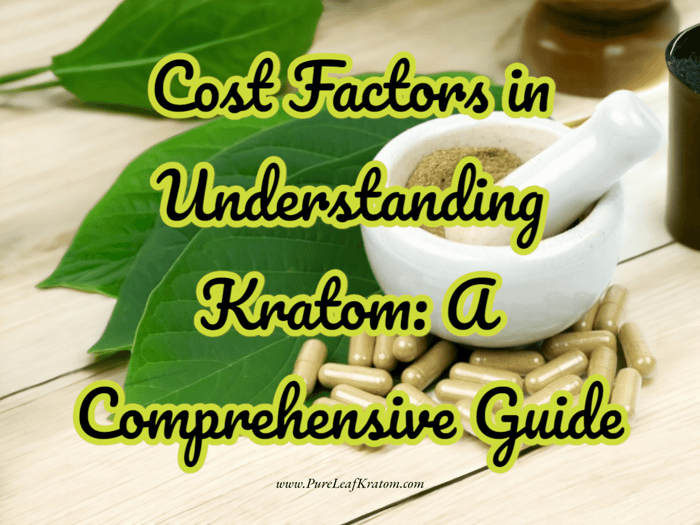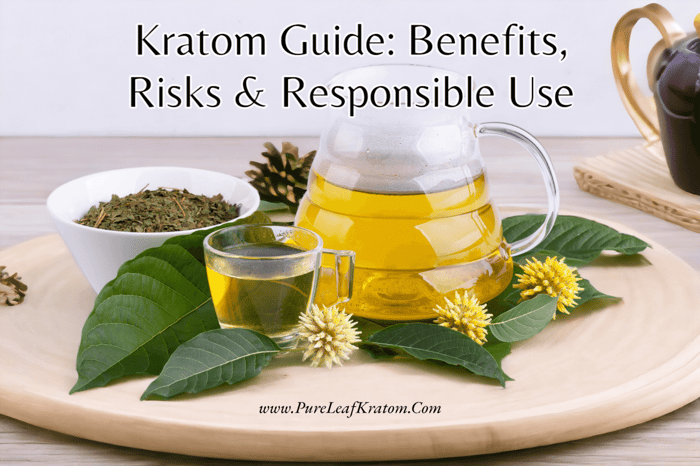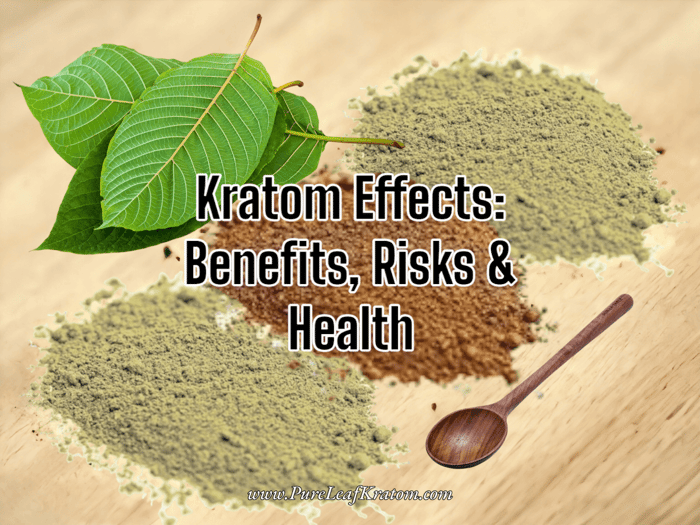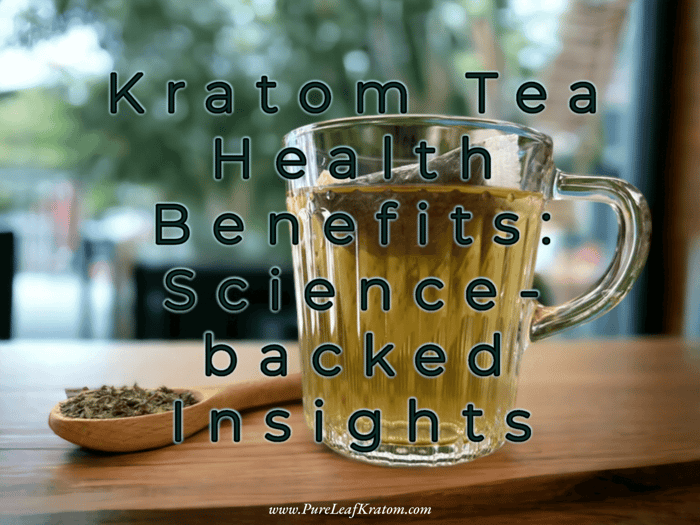
Demystifying Kratom Tea: A Science-backed Examination of its Physical Health Benefits
Unveiling the Ancient Brew: An Overview of Kratom Tea
Mention "tea" and most minds will conjure images of a hot cup filled by a sachet of dried leaves – peppermint, green, or Earl Grey being the usual suspects. Yet, there lies a whole world of brews less explored but rich in culture and history. One such outlier is Kratom tea, a unique blend steeped in centuries-old traditions, hailing from the lush forests of Southeast Asia.
The Historical Context
Kratom, or Mitragyna speciosa, is a part of the coffee family, native to countries such as Thailand, Malaysia, and Indonesia. Historically, manual laborers in these regions chewed the leaves or brewed it into a tea to combat fatigue, boost productivity, and handle the extreme tropical weather. Its cultural usage extends to traditional medicine where it has been used as a remedy for various ailments.
A Peek into the Leafy Brew
Kratom tea isn't your run-of-the-mill steeped drink. It stems from the leaves of the Kratom tree, which contain key active compounds – mitragynine and 7-hydroxymitragynine, which are known to have significant affective and physiological outcomes.
Contrary to popular teas derived from Camellia Sinensis, the indigenous people do not ferment kratom leaves. Instead, the leaves are often chewed fresh or dried for later use. The brewing process, therefore, brings out these alkaloids in a potent concoction, setting the stage for a spectrum of potential effects, contrary to the mild and often calming outcomes associated with conventional teas.
Mainstay in herbal medicine, these compounds interact with the body’s opioid receptors, potentially influencing mood, pain perception, and other aspects of physical and mental health. Further exploration of these interactions could prove critical for understanding Kratom’s role within the realms of natural and holistic health practices. However, it’s important to note that while there is growing interest and anecdotal evidence supporting these outcomes, more rigorous scientific studies are needed.
Influence in Modern Herbal Medicine
Much like how the past employed it, the narrative of Kratom in modern herbal medicine is woven with its potential to alleviate physical discomfort and enhance cognitive performance.
Thanks to its key compounds, Kratom also gets a berth in the realm of neuropsychiatric therapy. Researchers are keenly exploring kratom's potential as a natural alternative to traditional opioids for pain relief, with a hope to offer respite to those grappling with chronic pain. You have your usual suspects like back pain, but the potential relief also extends to arthritis and nerve pain among others.
A Cautionary Note
As with all things potent and influential, there’s a cautionary tale to be told about this tea. Its strong outcomes make it important for users to approach it responsibly. Excessive usage may lead to undesirable effects and there's a need for more scientific research to validate its benefits. While its remarkable potential cannot be overlooked, it's crucial to approach it with an informed perspective.
Chief Kratom Extract Liquid Shot
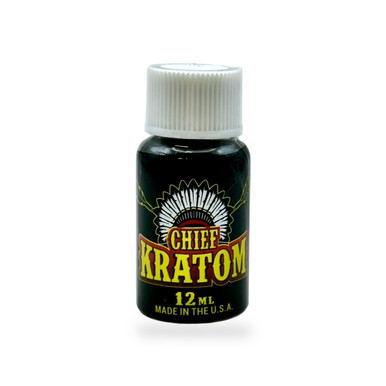
$7.75
Chief Liquid Kratom Extract Shot Discover the Chief Kratom Liquid Extract Shot, an exceptional breakthrough in the world of botanical extracts. Crafted through a unique...… read more
Out of Stock
Preparation of Kratom Tea
Kratom tea, derived from the leaves of the Mitragyna speciosa tree native to Southeast Asia, is easy to prepare at home with only a few required ingredients. This herbal brew offers potential benefits like pain relief, anxiety relief, mood enhancement, and energy boosting — making it a worthwhile addition to your wellness routine.
Steps in Making Kratom Tea
Preparing this tea revolves around brewing the leaves of the kratom plant, just as you would any other type of tea. The process is straightforward, allowing ample room for personal tweaks and adjustments to match your taste.
Required Ingredients and Their Roles
- Kratom powder or leaves: This is the main ingredient. Choose a strain that suits your needs, as different varieties can have varied effects — some are better for energy and focus, while others are better suited for pain relief or anxiety relief.
- Water: This acts as the base of your tea.
- Lemon or Lime: Citrus fruits can enhance the extraction of the alkaloids from kratom, promoting a more potent brew.
- Sweeteners (Optional): Honey, stevia, or sugar can combat the somewhat bitter taste of kratom tea.
Detailed Process of Preparation
The process of preparing kratom tea is generally as follows:
- Combine your chosen amount of kratom with water in a pot.
- Add a squeeze of lemon or lime juice, if desired.
- Simmer the mixture over low heat for 15-20 minutes.
- Strain the mixture to remove any undissolved particles.
- Add your preferred sweetener, if desired, and enjoy.
Different Methods and Variations
While this traditional method is quite common, there are several variations you can try. For example, some people skip the straining step and consume the kratom residue along with the tea for maximum benefits. Others prefer to use a French press or an automatic tea maker for convenience. You could even try making kratom iced tea or mixing it with other herbal teas for a different flavor profile.
Remember, the strength and effects of your tea can be affected by the strain of kratom you use, the amount of kratom powder or leaves, the duration of steeping, and the presence of any other ingredients you might add. As such, you may need to experiment to find the method and recipe that works best for you.
Physical Health Benefits of Kratom Tea
The health advantages of Kratom tea stem from its natural constituents, notably the alkaloids mitragynine and 7-hydroxymitragynine. These chemical compounds interact with the body's opioid receptors, resulting in varied effects that can potentially improve health and wellbeing. Recognized health benefits range from fostering overall wellbeing to enhancing physical performance and combating specific ailments. Although continued research is necessary to fully comprehend and authenticate all the possible health benefits, several potential advantages then stand out.
Digestion and Metabolism
Kratom tea has long been used in traditional medicine for its beneficial effect on digestion. Biologically, the alkaloids found in Kratom leaves stimulate the sympathetic nervous system, enhancing metabolic activity and promoting digestion. Kratom tea, therefore, can potentially alleviate digestive disorders like bloating, constipation, and abdominal cramps, making it an effective digestive aid.
Additionally, the increased metabolism caused by this tea might contribute to weight loss initiatives. The stimulant effect of Kratom leaves may enhance physical energy and endurance levels, helping those looking to balance their body weight or adhere to a weight-loss plan.
Cardiovascular Health
Research indicates that the tea could potentially be beneficial for cardiovascular health. The active alkaloids, particularly mitragynine, may affect the body's hormonal system and reduce inflammation in the body, including the blood vessels and arteries. This could potentially result in a reduction in blood pressure, decreasing the risk of ailments like atherosclerosis, strokes, and heart attacks. Yet, it's worth mentioning that excessive consumption could potentially lead to increased heart rate, emphasizing the importance of moderate intake of Kratom tea.
Immune System Boost
Kratom leaves contain several antioxidants, including the immune-boosting alkaloids isomitraphylline and isorhynchophylline. Traditional beliefs suggest that daily consumption of a moderate amount of Kratom tea can boost the immune system functioning and potentially increase the body's ability to fight off illnesses.
Furthermore, these antioxidant properties can battle free radicals in our body, reducing overall oxidative stress levels. Therefore, regular measured intake of Kratom tea could potentially contribute to maintaining optimal immune system health and keeping various health disorders at bay.
Golden Grove Kratom Extract Beverages Plum Ginger Sparkling Tonic 7.5oz
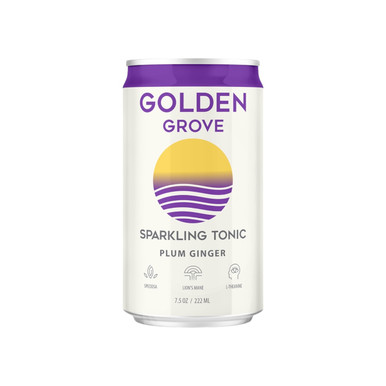
$6.89
Golden Grove kratom Extract Beverages Plum Ginger Sparkling Tonic 7.5oz Golden Grove Kratom Extract Beverage in Plum Ginger Sparkling Tonic brings together bold flavor and...… read more
Kratom Tea for Pain Relief
One of the most valued potential benefits of kratom tea lies in its perceived ability to mitigate chronic pain. This claim has been the subject of various scientific studies, exploring the effects of kratom's active alkaloids on the body's pain perceptions and response mechanisms.
Effect of Kratom on Chronic Pain
Underlying Science: Mechanism of Action
The pain-relieving properties in kratom tea are predominantly attributed to the two active alkaloids - mitragynine and 7-hydroxymitragynine. These alkaloids are thought to influence the body's opioid receptors, specifically the mu and delta receptors, in a way similar to how opioids work, albeit without the addictive properties.
By binding to these receptors, kratom alkaloids can interfere with the transmission of pain signals to the brain, temporarily reducing the perception of pain intensity. This has the potential to provide users with significant pain relief, especially in cases of chronic conditions.
Types of Pain Manageable with Kratom Tea
Kratom tea may be helpful for a variety of pain types. This includes neuropathic pains, which arise from nerve damage, as well as nociceptive pains, typically due to physical damage to body tissues. Users report that kratom tea can help with conditions such as chronic back pain, arthritis, and fibromyalgia.
It's important to note that while kratom tea may help manage these conditions, it should not be used as a substitute for professional medical advice or treatment.
Detailed Overview of Relevant Research and Studies
Multiple studies have looked into the pain-relieving potential of kratom. A comprehensive review of scientific literature on kratom use published provides confirmatory evidence of its analgesic properties.
Another study discovered that mitragyna speciosa (kratom) demonstrates considerable promise for alleviating opioid withdrawal symptoms and chronic pain.
However, it's important to remember that most of these studies are in their preliminary stages, and more extensive, controlled human clinical trials are necessary for concrete conclusions.
In conclusion, while this tea appears to offer potential for pain relief, further research is needed. Anyone considering it for pain relief should do so under the guidance of a healthcare professional.
Kratom Tea for Anxiety Relief
The calming and soothing effects of kratom tea make it a popular choice for natural anxiety relief. At a time when anxiety disorders affect nearly 40 million people in the United States alone, exploring less conventional treatment methods like kratom tea is not just relevant but also pertinent.
The Role of Kratom in Treating Anxiety
Managing anxiety effectively can be challenging because of its complex nature. It involves both psychological and physiological responses, making it difficult to target with conventional medications due to potential side effects. This is where kratom tea offers an alternative, as the active compounds within may help manage anxiety symptoms without significant adverse effects.
Underlying Science: Mechanism of Action
The analgesic effects of the tea are attributed to the compound mitragynine, which binds to opioid receptors in the brain. These receptors are part of the body's natural pain relief system, but they also form part of the stress response system. When mitragynine attaches to these receptors, it can potentially alter the brain's perception of stress and anxiety symptoms, providing relief.
Cortisol and Stress Management
When we are under stress, our bodies release cortisol, a steroid hormone that prepares us for the 'fight or flight' response. Chronic exposure to cortisol can lead to the development of anxiety disorders. Such disorders can also worsen physical ailments, such as chronic pain, creating a vicious cycle. The calming effect of kratom tea can help manage stress, potentially reducing the release of cortisol and breaking this cycle, offering relief to people experiencing chronic anxiety.
Detailed Overview of Relevant Research and Studies
Though research is limited, existing studies offer some insight into the potential benefits of kratom tea in managing anxiety. A study in the Journal of Psychoactive Drugs found that kratom users reported significant relief from depression and anxiety symptoms. However, as is the case with any health supplement, individuals should use kratom responsibly and under medical advice to ensure they do not experience any adverse effects.
Kratom Tea as an Energy, Focus, and Creativity Booster
Understanding the influence of kratom tea on energy levels, focus, and creativity involves rooting this discussion in the underlying science.
The Effect of Kratom on Energy Levels and Mental Clarity
Kratom, especially in lower doses, is often associated with providing a significant energy boost, comparable with the effects of caffeine. This is believed to be due to the mitragynine compound's interaction with the sympathetic nervous system, stimulating the release of adrenaline and noradrenaline, hormones associated with increased energy and alertness.
Underlying Science: Mechanism
Here's what is happening on a cellular level: when consumed, kratom's active compounds, mitragynine, and 7-hydroxymitragynine, bind to opioid receptors in the brain, leading to a surge of neurotransmitters. This process can result in increased awareness and focus. The compounds function as stimulants in their initial stages of activation, energizing the body by enhancing metabolic processes.
Impact on Productivity and Creativity
Many users report feeling more motivated, productive, and creative after consuming the tea. This is likely due to the mental clarity and energy boost that can help stimulate thought processes and enhance problem-solving abilities. However, the creative and cognitive enhancements provided by kratom tea may vary among users due to individual body chemistry and the specific kratom strain used.
Detailed Overview of Relevant Research and Studies
Research in this area is still emerging, but some studies suggest potential benefits. A survey published in Drug and Alcohol Dependence reported that of the 2798 respondents, around 23% used kratom for enhancing mood and mental performance. Another study published in the Journal of Medicinal Chemistry proposed that the active component mitragynine stimulates adrenergic and serotonergic pathways, promoting alertness, focus, and motivation. Still, further research is needed to better understand and validate these observations.
In concluding, it's crucial to remember that using kratom as a performance enhancer should be balanced with awareness of its potential side effects and the importance of moderate consumption.
Kratom tea, with its rich blend of alkaloids, is believed to have the potential to aid in the treatment of various ailments, including opioid withdrawal, nerve pain, and inflammation. Here, we delve into the underlying science and mechanisms of action behind these claims, providing relevant research on the role of Kratom in managing these conditions.
Kratom for Opioid Withdrawal, Nerve Pain, and Inflammation
The properties of Kratom, particularly the alkaloids mitragynine and 7-hydroxymitragynine, have a similar effect on the body's opioid receptors as opioids. This helps the body to reduce the intensity of withdrawal symptoms during the detoxification process from substances like heroin and prescription painkillers. Research indicates that Kratom can relieve symptoms such as nausea, vomiting, and aches related to opioid withdrawal.
When it comes to nerve pain, the interaction of Kratom with opioid receptors can also serve as a nerve pain relief. The alkaloids in Kratom numb the body's pain receptors, offering respite from conditions like sciatica and neuropathy. However, a definitive conclusion in this regard is subject to more exhaustive research.
As an anti-inflammatory, Kratom works by stifling inflammation-triggering signals in the body and reducing swelling and discomfort. It's been observed that in animal models, Kratom can noticeably reduce inflammation, though science still needs to confirm these findings in humans.
Kratom for Potential Aid in Sleep Disorders, Depression, and PTSD
Anecdotal evidence suggests promising leads on the role of Kratom tea in helping with sleep disorders, depression, and even PTSD. However, it should be noted that these potential benefits are not firmly rooted in scientific evidence.
Some individuals claim that Kratom tea helps induce sleep by calming the mind and body. Also, its sedative effect due to the alkaloid 7-hydroxymitragynine can potentially aid individuals with insomnia.
As for depression and PTSD, the potential benefits are tied to the mood-enhancing qualities of Kratom tea. Its active compounds may alter the brain's perception of stress and anxiety, therefore providing relief for individuals with depression or PTSD.
Pure Leaf Kratom Extra Strength Maeng Da Powder
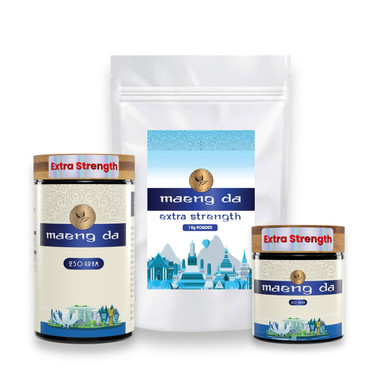
$29.95
Pure Leaf Kratom Extra Strength Maeng Da Powder Step into a realm of extraordinary well-being that transcends the ordinary with Pure Leaf Kratom Extra Strength...… read more
Out of Stock
Relevant Research on Kratom's Efficacy in Treating These Ailments
It is essential to note that while there is a growing body of anecdotal evidence and preliminary laboratory findings supporting the potential therapeutic use of Kratom, it requires additional rigorous, well-designed clinical trials to understand its true potential better. Promisingly, a recent study has highlighted that Kratom tea shows promise as a treatment for opioid withdrawal. More such studies could pave the way for this herbal brew to serve as a beneficial aid in managing various ailments.
Potential Side Effects of Kratom Tea
Like any health supplement, kratom also carries the risk of potential side effects and should be consumed with caution. Let's look at the possible risks, contraindications, dependency issues and the current legal status surrounding kratom tea.
Possible Side Effects and Risks
Kratom tea, while touted for a variety of potential health benefits, can also lead to adverse effects. Some commonly reported side effects include nausea, constipation, and loss of appetite, which could impact your overall wellness. In some instances, consumers have reported more severe symptoms such as hallucinations and seizures, although these are rarer cases and usually associated with higher doses.
Overdose and Dependency Issues
The alkaloids in kratom tea, particularly mitragynine and 7-hydroxymitragynine, can be addictive when consumed in high doses over a prolonged period. In such cases, abrupt discontinuation can lead to withdrawal symptoms, which may include irritability, anxiety, muscle aches, and insomnia.
As with other substances, the effect of kratom tea depends largely on the dosage. The line between beneficial dosage and overdose can be thin, thus moderation is key. Consuming more than the recommended amounts might cause side effects such as respiratory distress, comparable to opioid overdose.
Regulatory Status and Legal Issues Surrounding Kratom Tea
The legal status of kratom tea varies across different regions in the world. In some places, it's legal and freely available, while in others, it's categorized as a controlled substance with restrictions on sale and use. In the United States, kratom is legal in most states, but its status is often undergoing scrutiny and potential change.
While the tea is generally considered safe when used appropriately, the Food and Drug Administration (FDA) has not approved kratom for medicinal use. Research into its potential benefits and side effects is ongoing, and it is advisable to consult with a healthcare professional before starting any new supplement regimen, especially for those with underlying health conditions or those on other medications.
Disclaimer
The products discussed here and any claims or suggestions made have not been evaluated by the Food and Drug Administration (FDA). This content is not intended to diagnose, treat, cure, or prevent any disease.
The information on this website is provided for general informational purposes only and should not be relied on as the sole basis for making decisions – we encourage consulting primary, qualified, more complete, or professional sources. Any reliance on the material on this site is at your own risk.
Information shared on this site may be updated at any time and may include information or data that are no longer current, accurate, or complete and is provided for your reference only. We are not obligated to update published content, and it is the reader’s responsibility to monitor any changes and to consult with primary, qualified, more complete, or professional sources.
We make no guarantees regarding the completeness, accuracy, or reliability of the information provided, nor do we warrant that any products, services, or materials offered will meet individual expectations. Use of this site and its content is at your own discretion and risk.


